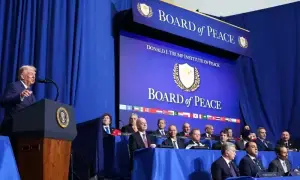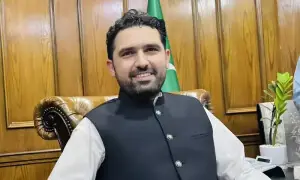IMF acknowledges progress as Pakistan completes SBA program, secures final tranche
4 min readPakistan has successfully completed its 9-month economic reform program supported by the International Monetary Fund (IMF), receiving a final disbursement of $1.1 billion. The Fund issued a statement on Monday acknowledging Pakistan’s progress in achieving economic stability.
The IMF executive board approved the release of final tranche of $1.1 billion.
The program, aimed at addressing domestic and external imbalances, has yielded positive results, including moderate economic growth, improved fiscal position, and increased foreign exchange reserves, according to the IMF.
The IMF commended Pakistan’s efforts in achieving a primary surplus, exceeding initial projections, and stabilizing the energy sector. However, it emphasized the need for continued policy commitment to ensure long-term economic stability and inclusive growth.
“Pakistan should capitalize on this hard-won stability,” stated Antoinette Sayeh, IMF Deputy Managing Director, urging the country to persevere with sound macroeconomic policies and structural reforms beyond the program’s completion.
Challenges remain, including high inflation, which is expected to reach around 20% by June 2024. The IMF recommends maintaining a tight monetary policy to control inflation and further strengthen the financial sector. Additionally, accelerating structural reforms in areas such as state-owned enterprises, governance, and climate resilience is crucial for promoting sustainable growth and job creation.
The IMF statement is being reproduced below in full text:
Washington, DC – April 29, 2024: Today, the Executive Board of the International Monetary Fund (IMF) completed the second and final review of Pakistan’s economic reform program supported by the IMF’s Stand-By Arrangement (SBA). The Board’s decision allows for an immediate disbursement of SDR 828 million (around $1.1 billion), bringing total disbursements under the arrangement to SDR 2.250 billion (about $3 billion).
Pakistan’s 9-month SBA, approved by the Executive Board on July 12, 2023, successfully provided a policy anchor to address domestic and external imbalances as well as a framework for financial support from multilateral and bilateral partners. The program focused on (i) necessary fiscal adjustment and maintenance of debt sustainability via FY24 budget implementation; (ii) protection of critical social spending; (iii) buffering external shocks and eliminating FX shortages by returning to proper FX market functioning; (iv) making progress on disinflation by maintaining a tight monetary policy; and (v) furthering progress on structural reforms, focused on energy sector viability, SOE governance, and climate resilience.
Macroeconomic conditions have improved over the course of the program. Growth of 2 percent is expected in FY24 given continued recovery in the second half of the fiscal year. The fiscal position continues to strengthen with a primary surplus of 1.8 percent of GDP achieved in the first half of fiscal year 2024, well ahead of projections and putting Pakistan on track to achieve its end-FY24 target primary surplus of 0.4 percent of GDP. Inflation, while still elevated, continues to decline, and, with appropriately tight, data-driven monetary policy maintained, is expected to reach around 20 percent by end-June. Assuming ongoing sound policies and reform efforts, inflation should return to the SBP’s target with growth continuing to strengthen over the medium term. Gross reserves have increased to around $8 billion, up from $4.5 billion at the start of the program, and are projected to continue being rebuilt over the medium term.
Following the Executive Board discussion, Antoinette Sayeh, Deputy Managing Director and Chair, made the following statement:
“Pakistan’s determined policy efforts under the 2023 Stand‑By Arrangement (SBA) have brought progress in restoring economic stability. Moderate growth has returned; external pressures have eased; and while still elevated, inflation has begun to decline. Given the significant challenges ahead, Pakistan should capitalize on this hard‑won stability, persevering—beyond the current arrangement—with sound macroeconomic policies and structural reforms to create stronger, inclusive, and sustainable growth. Continued external support will also be critical.
“The authorities’ revenue performance, as well as federal spending restraint, helped achieve a sizeable primary surplus in the first half of FY2024, in line with program targets. Continued revenue mobilization efforts and spending discipline at both federal and provincial levels remain critical to ensure that the primary surplus target is achieved. Beyond FY2024, continued fiscal sustainability and additional space for social and development spending depend on further mobilizing revenues, especially from non‑filers and undertaxed sectors, and on improving public financial management.”
“The authorities have stabilized the energy sector’s circular debt over the course of the SBA through timely tariff adjustments and enhanced collection efforts. While these actions need to continue, it is also critical that the authorities undertake cost‑side reforms to address the sector’s underlying issues and viability.
“The State Bank of Pakistan’s tight monetary policy stance remains appropriate until inflation returns to more moderate levels. Further improvements in the functioning of the foreign exchange (FX) market, together with a market‑determined exchange rate, will help buffer external shocks and attract financing, thereby supporting competitiveness and growth. The significant rebuilding of FX reserves under the SBA needs to continue. Moreover, stronger action to address undercapitalized financial institutions and, more broadly, vigilance over the financial sector are needed to ensure financial stability.
“Achieving strong, long‑term inclusive growth and creating jobs require accelerating structural reforms and continued protection of the most vulnerable through an adequately‑financed Benazir Income Support Program. Priorities include advancing the reform of state-owned enterprises (SOEs), including to ensure that all SOEs fall under the new policy framework; strengthening governance and anti‑corruption institutions; and continuing to build climate resilience.”
For the latest news, follow us on Twitter @Aaj_Urdu. We are also on Facebook, Instagram and YouTube.
























Comments are closed on this story.